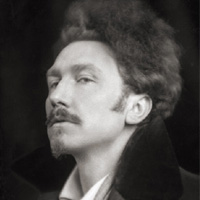Ezra Pound - Biography and Works
Ezra Pound, an American Poet and critic, was educated at Pennsylvania State University, where he took a master's degree in Romance languages. He was appointed lecturer in French and Spanish at Wabash College in 1907, but was dismissed from this post ostensibly for disapproving of the narrowness of the academic discipline.

Ezra Pound (1885-1972)
He left for Europe and his first book, A Lume Spento, was published in Italy in 1908. He spent the years from 1908 to 1920 in London, marrying in 1914. He moved to Paris (1920-24) and then to Italy again, settling finally in Rapallo.
During all this he was constantly helping other artists (Joyce, Eliot, Antheil, Tagore, and Hemingway, for example) as well as writing poetry and criticism. During the Second World War, he made several broadcasts from Italy, was arrested in 1945, put in the stockade at Pisa, flown to Washington and tried for treason. Declared unfit to plead, he was imprisoned in St. Elizabeth's Hospital from which he was released in 1958. He returned to live with his daughter in the Italian Tyrol. He is known for Hugh Selwyn Mauberley, The Pison Cantos, The Cantos of Ezra Pound.
Pound's role in the editing of The Waste Land has been the subject of much critical controversy. Eliot credited Pound with turning The Waste Land ‘from a jumble of good and bad passages into a poem.’ He wrote to Quinn that the manuscript of The Waste Land ‘is worth preserving in its present form solely for the reason that it is the only evidence of the difference which his (Pound's) criticism has made to this Poem.’ When Quinn saw the original manuscript in mid-January 1923, however, he wrote to Eliot that personally he 'should not have cut out some of the parts that Pound advised you to cut out' (WL Drafts, p. xxvi). Pound also removed much of the grossness and crudity in the original version of episode between the typist and the clerk. 'The Fire Sermon' was reduced from a draft of about 200 lines to 75 by Pound's skilful editing.
On the whole Pound's editing streamlined the poem, and gave it greater unity and coherence. He cut away material that he thought extraneous and located the underlying rhythm and music of the poem. Pound did not add anything to the poem. His main contribution was to discriminate between what was veritable and genuine, and the false or factitious writing, and so to elicit what Eliot had actually achieved. Eliot described Ezra Pound as the better -craftsman' in order to honor the technical mastery and critical ability to manifest in his own work, which had also done so much to turn The Waste Land "from a jumble of good and bad passages into a poem."
Ezra Pound was a "traditionalist" in a way, his ideas reject Stein's "past-less" writing. Perhaps because he valued a "sense of history", he lived most of his life in Europe as an expatriate writer. He supports the theory of TS Eliot which states that knowledge of tradition is necessary for the poet to create new poetry. His long poem Hugh Selwyn Mauberley has inspired Eliot to write The Waste Land.
Pound's critical theories have influenced many important American and British poets. From 1909 through the twenties, he was involved in most of the major artistic movements. The main idea of his theory is that: "Literature is language charged with meaning." (ABC of Reading, 1934) He had been a leader of the "Imagist" school of poetry. He believed that good poetry was based in images (pictures of solid, real things) rather than ideas. He was also influenced by Asian literature. In fact, his most famous Imagist poem, In a Station of the Metro, is rather like a Japanese haiku:
The apparition of those faces in the crowd;
Petals on a wet, black bough
As he grew older, Pound's quarrel with Western society grew much worse. During World War II, he lived in Italy and made anti-American radio broadcasts for Mussolini. After the war, the American arrested him. He worked on his Cantos (1925-1972) until he died. This extremely long poem was left unfinished. Canto VII shows his feelings about the twentieth century.
